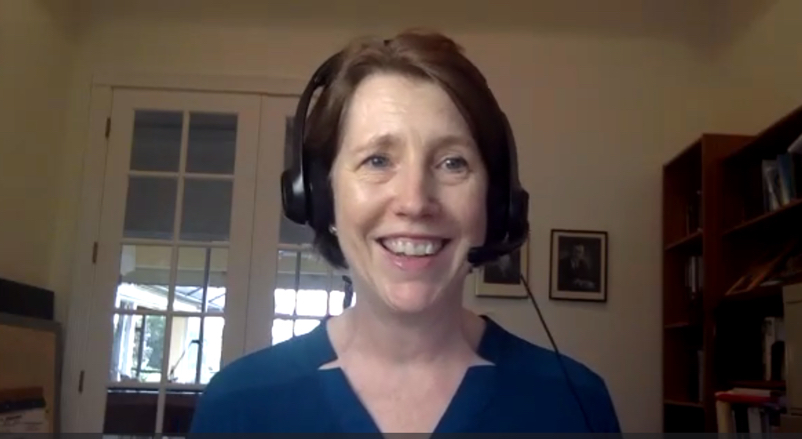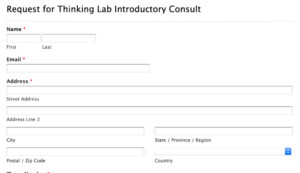Join the Thinking Lab to Support Achieving Your Ambitious Goals
What is the Thinking Lab?
 The Thinking Lab is a membership program for ambitious people who believe their own mental skill is critical to help them rise to new challenges. They seek skills for developing: clarity, creativity, decisiveness, emotional resilience, and self-motivation.
The Thinking Lab is a membership program for ambitious people who believe their own mental skill is critical to help them rise to new challenges. They seek skills for developing: clarity, creativity, decisiveness, emotional resilience, and self-motivation.
Members of the program have access to all the material I (Jean Moroney) have developed over the last 20+ years for developing the logical, introspective, and productivity skills that result in mental efficacy. Membership in the program includes:
- One 50-minute onboarding consult when you join as a paid regular member
- Two 1-hour video classes per month (audio recorded for members)
- “Thinking Days” every 2-3 months (roughly 10:00 a.m. – 5:00 p.m. ET) with access to Jean’s support throughout the day
- Unlimited access to the library of thinking tools
- Call-in information and recordings for any public free virtual classes during membership
- The opportunity for private one-on-one coaching with Lin Zinser, a trained Thinking Lab coach (for an extra cost). Read more and get a free introductory consult here.
- More than 12 major self-study courses on logical, introspective, communication, and productivity skills, including:
- Do What Matters Most
- Tap Your Own Brilliance
- Smarter Execution
- Just-in-Time Planning
- How to be Passionate About Your Priorities
- Non-Fiction Writing
- Gaining Mental Precision: Condensation, Concretization, Definitions
- Evolving a Scheduling Infrastructure
- Making Thinking Tactics Second Nature
- Gaining Objectivity about Emotions
- Introduction to Rationally Connected Conversations
How Tactics Help Thinkers Capitalize on Their Strengths
In this free 1-hour webinar, I explain how tactics help thinkers use their minds more effectively and why even the smartest, most effective thinkers benefit from using them. (In fact, they benefit the fastest, because they quickly integrate the tactics with their existing processes.)
Ready to join?
Get access to all classes, references, and recordings with two payment options:
Monthly Recurring Payments
One-Time Annual Payment
Pay for a year in advance and get 12 months for the price of 10, a 16% discount
Three reasons to join the Thinking Lab, one result:
Different people join the lab for different reasons. Here are the top three:
- You are focused on self-improvement, and see improved mental efficacy as foundational to your own progress
- You want a mentor to help inspire you to achieve your challenging goals, one who will not try to do your thinking for you
- You want to improve ineffective thinking habits that you picked up or learned from others — and mental efficacy is your means of doing that
What underlies all three of these reasons is: ambitious goals. An ambitious goal is the mightiest motivation for gaining mental efficacy.
Recent Master Classes
Click on any heading to open the Master Class description:
Dummy Accordion Tab
Giving Constructive Criticism the Second Time Around, 4/22/2025
In this Master Class, I will be talking with a Thinking Lab member who produces and sells portfolio and project management software to C-suite executives at large corporations. He sometimes needs to give constructive criticism to team members, suppliers, and customers, in order to solve problems that get in the way of achieving their shared goals. Previous classes have addressed how to prepare for such a conversation and execute on it. But despite preparation, sometimes the other person gets defensive and there is no productive discussion. Or sometimes the other person seems to listen, but doesn't actually make any changes. What can you do then?
After reviewing some basics from previous classes, we will discuss:
- The additional challenges you face in having multiple sessions of constructive criticism on the same topic
- The new information you gain from an unsuccessful feedback session — and how it can help you prepare for another round
- Your top mental priority going into a second round
Untangling Interconnected Social Problems, 4/15/2025
In this Master Class, I talk with a Thinking Lab member who is a retired technical project manager. She is extremely worried about some problems a young woman she knows well is having in her marriage. She wants to be more effective both in helping the woman and in managing her own emotions about the situation. She knows the husband, but is not as close to him as she is to the wife. Note that there are three people and three relationships, and she does not belong to one of the relationships. That is what makes this difficult.
In this class, we discuss:
- "Who owns the problem” — the need to distinguish one's own problems from the problems of others in the situation (and how you do that)
- How you can speak up about and find a "no-lose" solution to your problem
- How you can help another person find a "no-lose" solution to his or her problem
Pursuing a Challenging Discovery Goal by Yourself 3/18/2025
In this master class, we talk with a Thinking Lab member who has a very ambitious discovery goal and an original idea for how it can be pursued. He is working on this by himself, but he has trouble sustaining the momentum. Although he thinks he has the time for it, the uncertainty inherent in the project makes it hard to get started, and then the pulls from other people at home and work drag him away.
We discuss:
- How to identify short-term objectives and key results that can sustain such a discovery goal
- How to ensure every work session is intellectually rewarding
- The role of selfishness in addressing motivational problems
I expect this session to be helpful to everyone with a challenging goal they need to work on by themselves. I use other types of long-range goals (e.g., write a novel) as contrast in the discussion.
A Constructive Approach to Self-Criticism 3/11/2025
In this master class, I talk with a Thinking Lab member who is an expert software developer and debugger. He noticed that when he works on projects in which the next steps are not clearcut, self-criticism can seep in to undercut his motivation. Thoughts like "I should be smart enough to figure this out" or "This should be easier — I should be able to do this" can hit when the going gets tough. They activate a threat-oriented context. One possibility for addressing this problem is to learn additional tactics for quickly identifying better next steps. However, there will always be projects that stretch your skills for which getting into action sooner is more effective than taking time to identify better next steps. In these cases, you need to address the self-criticism directly. In this class, we discuss
- The benefit to you of self-critical thoughts
- Why it is hard to reject a mistaken self-critical thought without creating pressure
- Your secret weapon for defanging self-criticism
Developing Expertise while Pursuing Your Grand Goal 2/25/2025
In this master class, I talk with a Thinking Lab member who is working on an ambitious non-fiction writing project. In the long run, she will need more expertise than she has now for the full fruition of this project. In the meantime, it's a bit difficult to work on particular articles, because it seems like she needs the expertise first. This stretches the timelines and makes it difficult to get a payoff anytime soon. Plus, she's been very successful, and she is used to things being easy! We discuss:
- How to get high quality results on timely, doable tasks
- Leveraging your fundamental knowledge and skills when you lack specialized knowledge
- How to motivate yourself when it's harder than you thought
Sound interesting?
Recordings of all of these master classes are available to current members of the Thinking Lab.
Think you might be interested, but want to discuss it?
Request a free 20-minute introductory consult:
Recent Master Classes
Click on any heading to open the Master Class description:
Dummy Accordion Tab
Giving Constructive Criticism the Second Time Around, 4/22/2025
In this Master Class, I will be talking with a Thinking Lab member who produces and sells portfolio and project management software to C-suite executives at large corporations. He sometimes needs to give constructive criticism to team members, suppliers, and customers, in order to solve problems that get in the way of achieving their shared goals. Previous classes have addressed how to prepare for such a conversation and execute on it. But despite preparation, sometimes the other person gets defensive and there is no productive discussion. Or sometimes the other person seems to listen, but doesn't actually make any changes. What can you do then?
After reviewing some basics from previous classes, we will discuss:
- The additional challenges you face in having multiple sessions of constructive criticism on the same topic
- The new information you gain from an unsuccessful feedback session — and how it can help you prepare for another round
- Your top mental priority going into a second round
Untangling Interconnected Social Problems, 4/15/2025
In this Master Class, I talk with a Thinking Lab member who is a retired technical project manager. She is extremely worried about some problems a young woman she knows well is having in her marriage. She wants to be more effective both in helping the woman and in managing her own emotions about the situation. She knows the husband, but is not as close to him as she is to the wife. Note that there are three people and three relationships, and she does not belong to one of the relationships. That is what makes this difficult.
In this class, we discuss:
- "Who owns the problem” — the need to distinguish one's own problems from the problems of others in the situation (and how you do that)
- How you can speak up about and find a "no-lose" solution to your problem
- How you can help another person find a "no-lose" solution to his or her problem
Pursuing a Challenging Discovery Goal by Yourself 3/18/2025
In this master class, we talk with a Thinking Lab member who has a very ambitious discovery goal and an original idea for how it can be pursued. He is working on this by himself, but he has trouble sustaining the momentum. Although he thinks he has the time for it, the uncertainty inherent in the project makes it hard to get started, and then the pulls from other people at home and work drag him away.
We discuss:
- How to identify short-term objectives and key results that can sustain such a discovery goal
- How to ensure every work session is intellectually rewarding
- The role of selfishness in addressing motivational problems
I expect this session to be helpful to everyone with a challenging goal they need to work on by themselves. I use other types of long-range goals (e.g., write a novel) as contrast in the discussion.
A Constructive Approach to Self-Criticism 3/11/2025
In this master class, I talk with a Thinking Lab member who is an expert software developer and debugger. He noticed that when he works on projects in which the next steps are not clearcut, self-criticism can seep in to undercut his motivation. Thoughts like "I should be smart enough to figure this out" or "This should be easier — I should be able to do this" can hit when the going gets tough. They activate a threat-oriented context. One possibility for addressing this problem is to learn additional tactics for quickly identifying better next steps. However, there will always be projects that stretch your skills for which getting into action sooner is more effective than taking time to identify better next steps. In these cases, you need to address the self-criticism directly. In this class, we discuss
- The benefit to you of self-critical thoughts
- Why it is hard to reject a mistaken self-critical thought without creating pressure
- Your secret weapon for defanging self-criticism
Developing Expertise while Pursuing Your Grand Goal 2/25/2025
In this master class, I talk with a Thinking Lab member who is working on an ambitious non-fiction writing project. In the long run, she will need more expertise than she has now for the full fruition of this project. In the meantime, it's a bit difficult to work on particular articles, because it seems like she needs the expertise first. This stretches the timelines and makes it difficult to get a payoff anytime soon. Plus, she's been very successful, and she is used to things being easy! We discuss:
- How to get high quality results on timely, doable tasks
- Leveraging your fundamental knowledge and skills when you lack specialized knowledge
- How to motivate yourself when it's harder than you thought
Sound interesting?
Recordings of all of these master classes are available to current members of the Thinking Lab.
Think you might be interested, but want to discuss it?
Request a free 20-minute introductory consult:
Are you focused on self-improvement?
If you pursue challenging goals, you know there is always something you can improve in yourself. No matter what skill you learn, there is always a next level to master. There is always some area you are stepping up to improve.
The skills taught in the Thinking Lab support all kinds of self-improvement.
Introspective skills help you catch problems early when it’s easier to fix them, find creative paths to follow when you need a new approach, and generally get out of your own way so that you can work effectively without strain. They give you confidence in your mind as it stands, even as you grow it.
Productivity skills help you set goals you want to achieve, resolve conflicts that act like sand in your gears, and break projects into doable, interesting, engaging parts that you can’t wait to take action on. They give you control over your time and your life.
Logical skills help you test ideas as you go, consolidate what you learn, and (if needed) communicate it more effectively. They give you clarity about what you’re doing.
Most people have mental efficacy in some areas of their lives. However, expanding these to other areas is not always so easy. The Thinking Lab offers proven techniques to help you widen the area over which you have the confidence, clarity, and control that comes with mental efficacy.


Do you wish you had a mentor?
Every ambitious goal is made easier with the feedback and encouragement of someone who has been through similar experiences before. But if your goal is unique, you may find yourself working in isolation, without the cognitive, emotional, and motivational benefits of a mentor.
For some people, I make an ideal mentor. I may not know the specifics of your industry. But I know all about how to deal with growing pains, how to transform vicious cycles into virtuous ones, and how to manage your own mind as you pursue challenging goals. In addition to working to change all of the ineffective thinking habits mentioned in the next section, I have faced many other work challenges, including:
- The challenge of working alone. I found it easy to be productive when I worked in corporate America and someone else set the schedule and the priorities. Once I started working for myself, I had to solve dozens of problems to maintain my productivity.
- The challenge of communicating new ideas. My ideas don’t fit exactly into any existing bin. I have had to learn how to speak, write, and converse with people who, initially, have no particular interest in what I’m doing. And I’ve had to resist others who encourage me to change what I’m doing to something more familiar, but less valuable.
- The challenge of running a business, having never expected to do so. Among other things, I had to develop the personal motivation to learn sales and marketing skills — which I had no aptitude for, respect for, or interest in learning when I started out.
- The challenge of maintaining health. Over the last 25 years, I have overcome three chronic health challenges, each of which prevented me from working for significant periods. I know what it means to change your life to maintain your health. I take care of myself every day to avoid recurrences of these problems.
I use stories from my life in all of my newsletters and classes. For many people, especially those facing similar challenges, these stories are inspiring. I try to implement Voltaire’s maxim: “No problem can withstand the assault of sustained thinking.”
However, I think the reason some people find me a helpful mentor is my approach to coaching. Rather than offering advice and opinions, I offer methods for finding answers yourself. On Thinking Days, members raise tricky issues, I share how I would approach the problem, and often talk the member through the steps.
I know from my own experience pursuing challenging goals that another person rarely understands your context of knowledge and your value-hierarchy in enough depth to solve your problems for you. That is why so much advice is unhelpful.
However, other people can be a big help — if they can ask you the right questions to help you think through issues yourself, and if they can teach you the tools you need to manage your own thinking.
I no longer offer private coaching in the Thinking Lab, but I am delighted to report that Lin Zinser, a longtime colleague of mine, has come on board as the Thinking Lab coach. She has been trained both by a major certification program and by me to help Thinking Lab members use and apply the material I’ve developed in their own lives. You can read more about coaching with Lin Zinser here.
Are you concerned that you have some ineffective thinking habits?
If you consistently pursue challenging goals, you will eventually want to do things that are very difficult for you. If you keep learning, you will eventually discover that some of the hardest improvements to make involve ineffective thinking habits. Here are 5 common but ineffective thinking habits (a.k.a. psycho-epistemological problems):
1. Subjectivity: you hold your own beliefs and values as givens, rather than as conclusions you reached by a definite, recallable process.
Symptoms: You are surprised when people disagree with you or have different preferences. You often have trouble explaining why you believe an idea or why you value some person or thing.
Practical Obstacles Created: You have to rethink everything from scratch when there’s a problem. Other people often misunderstand you. You have trouble leading a team.
2. Rationalism: you treat ideas as deductive constructs.
Symptoms: You believe you know everything about what another person thinks on the basis of one sentence he utters. You often have trouble concretizing what you mean by an idea.
Practical Obstacles Created: You buy into dubious theories that don’t work in practice. You often misunderstand other people. You have trouble following a leader because his strategy doesn’t match yours.
3. Emotionalism: you treat emotions as evidence of truth and/or value.
Symptoms: When someone points out an indisputable fact inconsistent with your views, you feel cornered rather than curious. You often have trouble clarifying goals in terms of existential outcomes, as opposed to how you want to feel at the end.
Practical Obstacles Created: Your goals don’t motivate you. You communicate unclearly. You experience significant internal conflict.
4. Secondhandedness: you treat other people’s opinions as important per se, regardless of whether they are true and valid.
Symptoms: When other people disagree with you, you feel embarrassed or ashamed, or you feel desperate to change their minds. When you are pursuing a goal, images of other people’s reactions to your actions invade your thinking. Their concerns are a major consideration.
Practical Obstacles Created: You are pulled around by what other people think. You are indecisive. You don’t function well in a crisis when others are upset.
5. Duty Mentality: you treat your desires as irrelevant to your conclusions about what you should do.
Symptoms: You describe the obstacles to your goals in terms of temptation and resistance. You often feel you have to force yourself to do what is right. If you don’t, you feel guilty.
Practical Obstacles Created: You over-commit. You feel unmotivated. You work well only under pressure.
These ineffective thinking habits are based on wrong theories about how to gain knowledge, theories that you may not even know. The habits are normally formed by modeling other people’s behavior, “by osmosis.” Qua habits, they feel completely normal. But as a result of the ineffective thinking habits, you make the same kinds of mistakes, again and again, without even noticing you are making them. You see only in hindsight that something was wrong. Even then, many people conclude “something is wrong with me” or “I just don’t have the talent for this.”
Developing methods for retraining thinking habits is my central career goal, and virtually everything in the Thinking Lab was developed with an eye to improving them. Every tactic helps both to achieve short-term success, and to retrain ineffective mental habits over the long term. Generally speaking, the introspective skills help with all of the five problems I mention above, the logical skills help with subjectivity, rationalism, and emotionalism, and the productivity skills help with emotionalism, secondhandedness, and a duty mentality.
The idea that people have thinking habits (a “psycho-epistemology”) that can be changed is new, unique to Ayn Rand, and very little discussed — except in the Thinking Lab.
How Tactics Help Thinkers Capitalize on Their Strengths
In this free 1-hour webinar, I explain how tactics help thinkers use their minds more effectively and why even the smartest, most effective thinkers benefit from using them. (In fact, they benefit the fastest, because they quickly integrate the tactics with their existing processes.)
Think you might be interested, but want to discuss it?
Request a free 20-minute introductory consult:
Ready to join?
Get access to all classes, references, and recordings with two payment options:
Monthly Recurring Payments
One-Time Annual Payment
Pay for a year in advance and get 12 months for the price of 10, a 16% discount
Think you might be interested, but want to discuss it?
Request a free 20-minute introductory consult:

Ready to join?
Get access to all classes, references, and recordings with two payment options:
Monthly Recurring Payments
One-Time Annual Payment
Pay for a year in advance and get 12 months for the price of 10, a 16% discount
Frequently Asked Questions
Is the Thinking Lab right for me?
My goal for the Thinking Lab is that you develop the power of your own mind, which includes:
- the confidence you can learn a skill if you decide you need it
- the certainty you can change your automatized beliefs if you conclude they are mistaken
- the conviction that you can resolve any internal conflicts once you discover them
If you are wondering if the Thinking Lab is right for you, I offer a free 20-minute introductory consult. Just fill out the form at the bottom of this page.
Why are there so many more courses available in the Thinking Lab than the two offered on the Thinking Directions site?
The Thinking Lab format permits ongoing study, so more courses are appropriate for it.
The two courses described on the Thinking Directions site, “Do What Matters Most” and “Tap Your Own Brilliance,” are self-contained, polished courses that can be presented in a relatively short time frame. These are suitable for corporate and public programs on productivity.
In contrast, the Thinking Lab courses include some that require significant homework and some that are focused on personal development.
If you’ve attended any of my public or corporate courses, and want more material, in more depth, with more guidance, the Thinking Lab is the place where you can access versions of all the major courses I’ve developed.
Are all of the modules available for immediate download?
Yes. I used to dole the classes out one lesson at a time, to encourage people to send me the homework and/or notes from each lesson. I still recommend you do that, but you don’t have to wait to get the next class. Here are several reasons to get feedback:
- Everybody seems to do better with a little encouragement and feedback
- Getting members’ work helps me stay connected to their needs and progress
- Many of the classes available in the Thinking Lab are working versions rather than polished, finished products. Some of them are over 15 years old, and would benefit from updating. That means you can expect to have questions and need clarification. So ask for it!
To aid with the self-study programs, every 2-3 months I schedule a “Thinking Day.” This is an all-day (10:00 a.m.-6:00 p.m. ET) event in which members of the Thinking Lab take a day of self-study. We meet on the Zoom video/phone bridge in the morning to kick off the day. I am available during the day by Zoom video/phone bridge on a pre-arranged schedule to answer questions and give encouragement.
As part of a Thinking Day, I encourage you to choose one of the self-study programs to work through. You can then ask me questions about the course in the live Q&A during the Thinking Day.
Is the Thinking Lab just for Ayn Rand fans (Objectivists)?
No. It’s for anyone who resonates with my approach to problem-solving and decision-making.
However, my tips and teleclasses in the Thinking Lab tend to be “work in progress.” That often means I am working out an idea, which (for me) always involves analyzing it from an Objectivist viewpoint. As a result, I discuss Ayn Rand’s work more often and in more depth in the Thinking Lab than I do in the polished courses I offer to corporations and the general public.
In addition, because Ayn Rand stressed the importance of thinking, her fans are more likely to be concerned about their thinking methods. Thus, the Thinking Lab attracts a disproportionate number of Objectivists, but it is not just for Objectivists.
What happens when I join?
You will be set up with a login for the password protected area of the Thinking Directions site, and get a link to schedule your onboarding call with Lin Zinser. You’ll also get a recording of the most recent class. More questions? Email me at: jm@thinkingdirections.com or request an introductory consult, in the form below.


Ready to join?
Get access to all classes, references, and recordings with two payment options:
Monthly Recurring Payments
One-Time Annual Payment
Pay for a year in advance and get 12 months for the price of 10, a 16% discount
Thinking Lab Policy on Cancelling Recurring Payments
Note: there is a 3-month minimum on a Thinking Lab subscription.
After that, cancelling is easy. To cancel your subscription, email us at support@thinkingdirections.com or call 239-387-1717 by the 1st of the month. We will either cancel your future payment (if the charge for the upcoming month has not gone through), or refund it (if it has).

